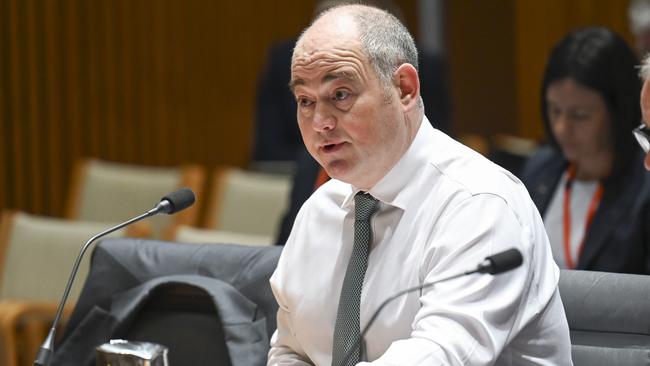NAB boss Andrew Irvine takes aim at ’outrageous’ card surcharges
National Australia Bank CEO Andrew Irvine has questioned whether credit and debit card surcharges remain fit-for-purpose, particularly after he was slugged 10 per cent extra on a coffee.

National Australia Bank chief Andrew Irvine has questioned whether credit and debit card surcharges remain fit-for-purpose, particularly after he was slugged with a 10 per cent surcharge on a coffee in Sydney.
Mr Irvine told the parliamentary standing committee on economics he found the surcharge levied on his coffee “outrageous”, and more broadly took aim at inconsistent, and confusing surcharges being charged by some merchants. He said the lack of transparency was also an issue.
“I personally don’t like surcharging,” Mr Irvine said. “It’s all over the place.”
Mr Irvine argued that surcharging was introduced in Australia when the cost of processing credit card transactions was “much higher”, and their usage alongside cash was more prevalent.
The Reserve Bank is aiming to release a consultation paper on surcharging by the end of 2024 as it conducts a detailed review of the practice within the broader payments landscape. Australia is one of few markets around the world that allows surcharging, with the rationale being it allows merchants and retailers to recoup costs they pay to banks and other payments companies to process transactions.
The RBA removed no-surcharge rules in this market in 2003, in a change that angered MasterCard and Visa.
Mr Irvine said of the RBA review: “Wherever this lands my hope is that it’s (surcharging) consistent and it can’t just be played with in this manner.
“Times have moved on quite significantly since those days … debit is much more prevalent, we have least cost routing and a domestic scheme that is taking market share, so it’s possible that surcharging was warranted over 20 years ago. But I think it behoves us to ask whether it still serves its purpose.”
Excessive surcharging sparked controversy in 2010 when Cabcharge was levying a 10 per cent charge on card payments in taxis and admitted to breaching the Trade Practices Act through its market dominance. At the time, Cabcharge agreed to pay penalties and costs of $15m in a settlement with the Australian Competition and Consumer Commission.
In 2016, consumers won a long battle against domestic airlines on excessive credit card surcharging as regulators clamped down on the practice.
Westpac boss Peter King on Thursday told the standing committee on economics some merchants were charging customers surcharges well above their costs, and he lamented little enforcement of the rules.
Commonwealth Bank chief Matt Comyn welcomed the RBA review on surcharging, labelling it an “important area”.
“Consumers do not expect to be surcharged for using cash, as the cost of cash is embedded in the cost of goods and services. Yet they are frequently surcharged for using a debit or credit card,” he told the committee.
“Payments technology moves quickly, and it is critical that the regulatory environment moves with it. Some legislation governing payments has been untouched for 30 years.
“To this end it is also critical that Australia passes amendments to the Payment System Regulation Act which will allow the RBA to properly monitor the payments ecosystem and intervene when needed.”
The RBA’s head of payments policy Ellis Connolly in June spoke about the central bank’s review of payments regulation, including the surcharge rules.
“It is time to ask whether the surcharging framework is still fit for purpose and whether any changes need to be made,” he said.
Mr Connolly noted the RBA’s surcharging regulations aimed “to encourage consumers to use lower-cost payment methods and strengthen the bargaining position of merchants relative to payment system operators”.
He also flagged that the RBA may also allow surcharging on buy now, pay later transactions, which have so far been exempt from the practice.
Separately, NAB’s Mr Irvine said the bank had “reluctantly” made changes to banker pay and bonuses in the mortgage space, given it was losing high-performing staff.
NAB has followed CBA in raising its maximum variable bonus amounts for home lending bankers to 80 per cent of their base salary.
That unwinds measures put in place around the time of the Hayne royal commission.





To join the conversation, please log in. Don't have an account? Register
Join the conversation, you are commenting as Logout